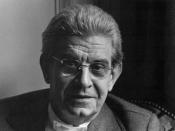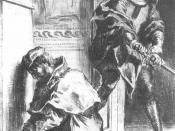In Freud's psychoanalytical analysis of the self, as well as Nancy Chodorow's theory of object-relations, the father plays a strong role in the development of male identity. The Oedipus theory explains that the need of a father is to create enough anxiety in a boy to help the boy to separate from the mother and identify with the father. The boy's fear of the father in accordance with his pre-Oedipal love interest in the mother helps the boy to identify with masculinity and separate his self from his primary love object that is his mother. The boy originally sees the mother as "not me," (Chodorow 67) which creates a gender identity for the male infant. The male infant then sees the father as close to his mother, which is his primary love interest. The son, then, is jealous of the father's closeness with the mother and therefore sees the father as a threat to his primary love interest.
This creates anxiety for the son, which is thought to be the corner stone of individuality and the development of the self. With out this anxiety, the son's masculinity may not develop as would a boy would who had a present father. As the boy moves from the pre-Oedipal to the Oedipal stage, the boy now sees his father as more like himself. He uses the father as mirror. The power that his father has is now envied by the boy, this envy also creates a masculine self because the boy can relate with the father. The balance of each individual in the triangle: mother, father and son, develops a secure male identity of the self.
The following will consider the effects on the male self if the father was not present in the various stages of the pre-Oedipal and Oedipal...


